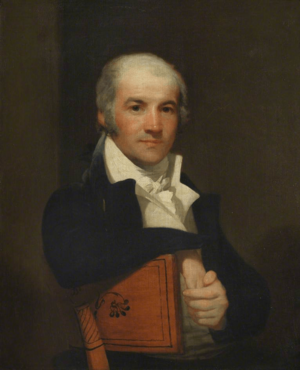Edward Thornton, 1st Count of Cacilhas facts for kids
Quick facts for kids
The Count of Cacilhas
|
|
|---|---|

Sir Edward Thornton, c. 1799, by Gilbert Stuart
|
|
| Envoy Extraordinary and Minister Plenipotentiary to the Court of Portugal | |
| In office 1823–1824 |
|
| Preceded by | Edward Michael Ward |
| Succeeded by | Sir William à Court |
| In office 1817–1820 |
|
| Preceded by | Thomas Sydenham |
| Succeeded by | Edward Michael Ward |
| Envoy Extraordinary and Minister Plenipotentiary at the Court of Stockholm | |
| In office 1812–1817 |
|
| Preceded by | Diplomatic relations severed due to Sweden's alliance with France |
| Succeeded by | Viscount Strangford |
| In office 1807–1808 |
|
| Preceded by | Hon. Henry Pierrepont |
| Succeeded by | Anthony Merry |
| Envoy Extraordinary and Minister Plenipotentiary to the United States | |
| In office 1800–1804 |
|
| Preceded by | Sir Robert Liston |
| Succeeded by | Anthony Merry |
| Personal details | |
| Born |
Edward Thornton
22 October 1766 London, England |
| Died | 3 July 1852 (aged 85) Plymouth, England |
| Spouses |
Wilhelmina Kohp
(after 1812) |
| Relations | Thomas Thornton (brother) |
| Children | 7 |
| Education | Christ's Hospital |
| Alma mater | Pembroke College, Cambridge |
| Occupation | Diplomat |
Sir Edward Thornton (born October 22, 1766 – died July 3, 1852) was an important British diplomat. A diplomat is someone who represents their country in other nations. Sir Edward helped build relationships between Britain and other countries. He was also the father of another famous diplomat, Sir Edward Thornton.
Contents
Early Life and Education
Edward Thornton was born in London, England. He was the third of five children. Sadly, both of his parents passed away when he was very young. This left him and his siblings without parents.
A kind family friend took care of him. Thanks to this guardian's help, Edward received a good education. He studied at Christ's Hospital and later at Pembroke College, Cambridge. These schools helped him prepare for his future career.
A Career in Diplomacy
Edward Thornton began his career as a diplomat in 1793. His first role was as a British vice-consul in Maryland, which is in the United States.
Serving in the United States
From 1800 to 1804, he served as Britain's top diplomat to the United States. His official title was Envoy Extraordinary and Minister Plenipotentiary. This means he was a special representative with full power to act for his country.
Working Against Napoleon
After his time in the U.S., Thornton held several diplomatic jobs in Europe. In 1807, he was sent to Sweden. His main goal was to create an alliance against Napoleon, who was a powerful French emperor. He returned to England in 1808.
He went back to Sweden in 1811 for another important mission. He successfully negotiated two treaties, both called the Treaty of Örebro. These treaties formed alliances with Sweden and Russia against Napoleon. This was a big step in uniting Northern European countries against France.
Thornton also helped negotiate the Treaty of Kiel for the United Kingdom. This treaty was important for peace in the region. In 1815, he was present when the allied forces entered Paris, marking a major victory against Napoleon.
Diplomat in Portugal
In 1816, Edward Thornton became a member of the Privy Council. This is a group of trusted advisors to the British monarch.
In 1817, he was appointed as a minister to Portugal. He even joined the Portuguese royal family in Brazil, where they had moved. From 1819 to 1821, he served as the ambassador to Portugal.
He returned to Portugal again from 1823 to 1824. During this time, he gave the King of Portugal a special honor called the Order of the Garter. He also helped the King during a difficult time of rebellion. For his important work, the King of Portugal gave Thornton and his family the special title of Count of Cacilhas.
Later Life and Family
In 1812, Edward Thornton married Magdalena Wilhelmina Amalia Kohp. They had seven children together—one daughter and six sons.
One of his sons, Edward Thornton, also became a famous diplomat. Another son, George Reginald Thornton, studied at Pembroke College, Cambridge, just like his father.
Sir Edward Thornton retired in 1824. He was recognized for his achievements, becoming a Fellow of the Royal Society in 1810 and receiving the GCB honor in 1822. He lived in Plymouth, England, until he passed away in 1852.
Honors and Legacy
In 1902, Christ's Hospital, one of the schools Edward Thornton attended, named one of its boarding houses after him. This was a way to remember his important contributions.
 | James B. Knighten |
 | Azellia White |
 | Willa Brown |

